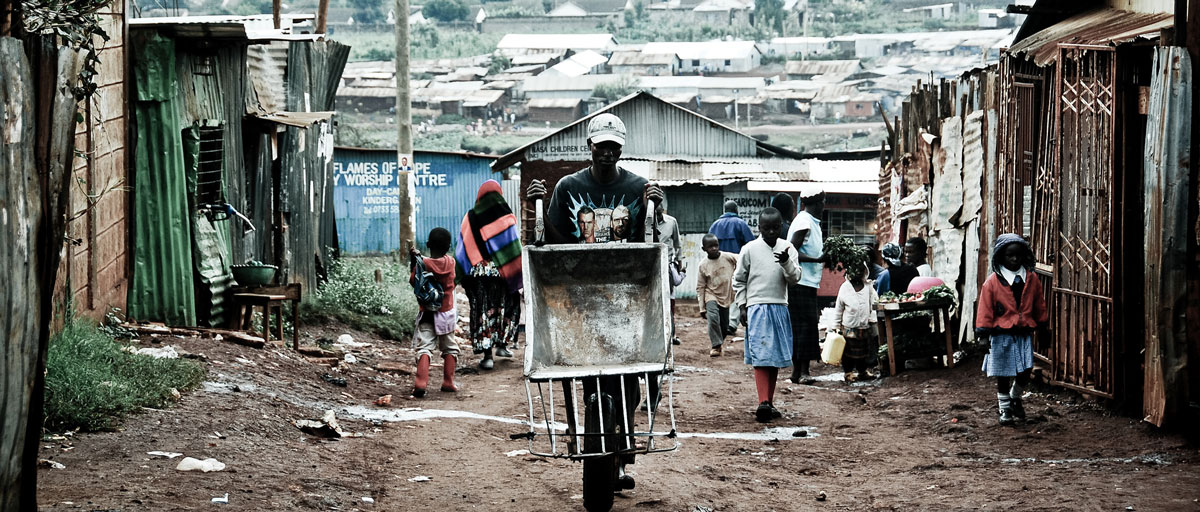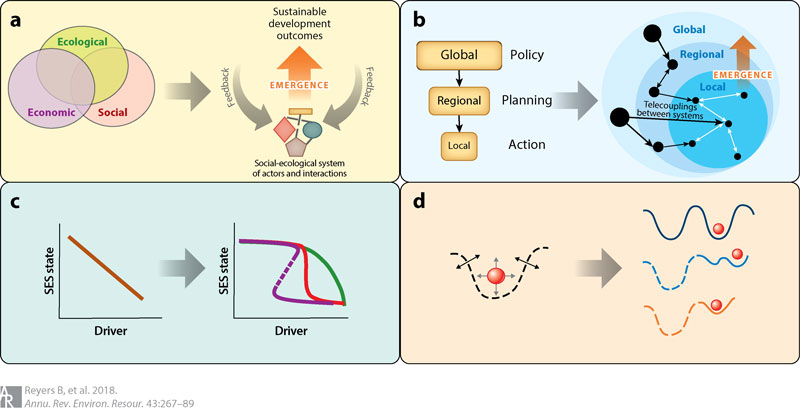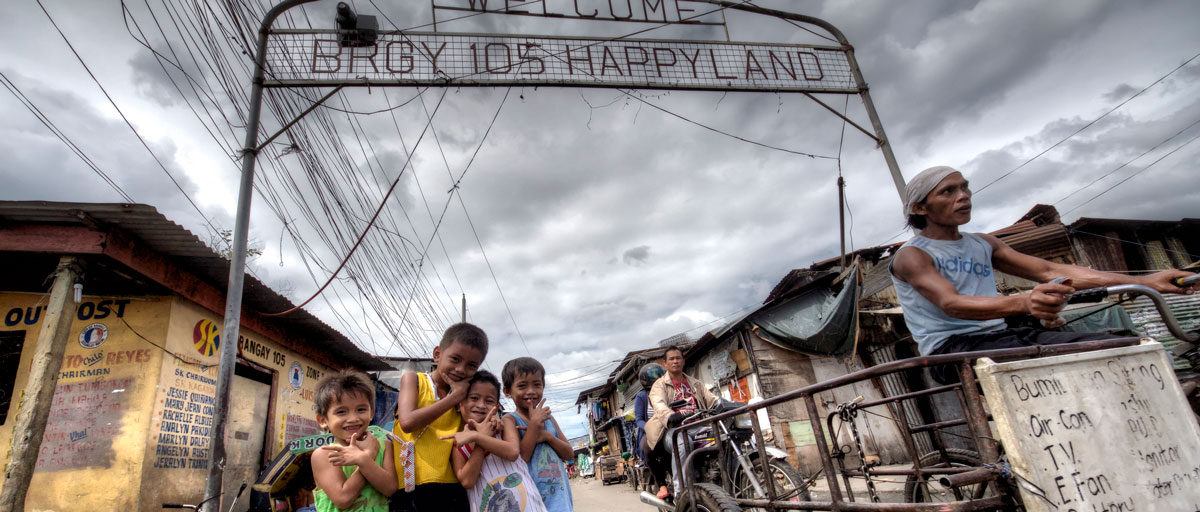
Achieving sustainable development in a human-dominated, complex and turbulent world will require new ways of thinking and practice. This is where social-ecological systems (SES) research comes in, offering new insights for research and practice, according to a recent synthesis in the journal Annual Review of Environment and Resources. Photo: S. Jensen/Flickr
Bildtext får vara max två rader text. Hela texten ska högerjusteras om den bara ska innehålla fotobyline! Photo: B. Christensen/Azote
Social-ecological systems
Four research insights for sustainable development in the 21st century
How social-ecological systems research can transform sustainable development to match the challenges of the Anthropocene
• Although the concept of sustainable development is not new, the complex Anthropocene context in which it now must be achieved is
• Insights from research on the inseparable nature of systems, the pervasiveness of cross-scale dynamics and systemic tipping points, and the need for transformational change highlight necessary shifts for sustainable development to contend with this new context
• These insights highlight the need for diverse values and approaches for sustainability development that are more in tune with the connections between social and ecological systems
Achieving sustainable development in a human-dominated, complex and turbulent world will require new ways of thinking and practice.
This is where social-ecological systems (SES) research comes in, offering new insights for research and practice, according to a recent synthesis by centre researchers Belinda Reyers, Carl Folke, Michele-Lee Moore, Oonsie Biggs and Victor Galaz.
“Moving beyond the notion of sustainable development as separable human development targets constrained by environmental or natural resource limits, to an inseparable SES perspective on sustainable development, offers a fresh perspective on sustainable development,” they write in the journal Annual Review of Environment and Resources.
Their article concludes that it is time for some major shifts in sustainability research and practice.
The Anthropocene clearly represents an intertwined world of people and nature different in many dimensions and functions from previous human experience.
Belinda Reyers, lead author
Four insights
The team of researchers reviews contemporary research on the study of SES and explores four major insights, which they label “intertwined SES”, “cross-scale dynamics”, “systemic tipping points” and “transformational change”.
The first insight points out that the delineation between human and natural systems is artificial and arbitrary, emphasizing instead the history and future of societies and ecosystems shaping and being shaped by each other. Shifts to policy interventions, targets, and adaptive management, which acknowledge and are based on the system’s irreducible complex structure, are proposed.
The second insight about “cross-scale dynamics” stresses the need to realise that “the local is no longer local”, but rather shaped by a range of interconnections between sectors and regions from local to global scales. Likewise, as the authors conclude, “the global is not just global”, but rather shaped by local patterns and events that may rapidly disperse between regions and across the world.
The third insight, on tipping points, stems from the growing evidence that ecosystems, social systems, and SES, do not always respond in an incremental and predictable way to increasing or decreasing external pressures. For instance, although slowly increasing nutrient pollution may first result in little or no change in a lake, beyond a certain critical threshold an additional increase in nutrient levels may suddenly trigger large and rapid changes to both the lake itself and the human community that depends on it. Such a large and persistent change in system structure and function is often referred to as regime shifts, critical transitions, or alternate stable states in the SES and resilience literature.
Finally, the fourth insight from SES-research deals with the need for transformative change to sustainability, because incremental adaptations to the problems associated with the Anthropocene are becoming increasingly insufficient. In fact, change is often required in inequality, power asymmetries, or environmental degradation, which created the problems in the first place. This also requires features of the current systems that constrain transformation to be broken down, the researchers write.
Necessary shifts
Climate change, food price shocks, forced migration, pandemics, and other kinds of turbulence, clearly show that the resilience of the Earth system as a whole is challenged, including suitable and desirable conditions for our own development.
“The Anthropocene clearly represents an intertwined world of people and nature different in many dimensions and functions from previous human experience,” lead author Belinda Reyers explains.
In this new situation, sustainable development approaches and policies designed for the past will be insufficient and may reinforce the complex problems we currently face. Instead SES research highlights the value of development practices that acknowledge and target the complex system structures, processes, and values underlying most development challenges.
Without practices connected to these underlying issues, practice at the more superficial, technical or practical levels will be insufficient. These and other necessary shifts in both sustainability research and practice are explored by the authors in more detail in their article
Finally, the authors note the significance of the social, institutional, and cultural contexts, heralding a shift for sustainable development to a broader appreciation of diverse values and beliefs.
Instead of a narrowing of options and pathways forward in the challenging context of the 21st of century, the author propose that SES insights offer new outlooks, practices, and novel opportunity spaces from which to transform sustainable development research and practice for the context of the Anthropocene and its long list of complex challenges.

Schematic representation of the shifts in sustainable development thinking and practice, as suggested by our review of social-ecologicalsystems (SES) research, (a) from interdependent pillars to inseparable complex social-ecological systems, (b) from local action to cross-scaledynamics, (c) from incremental change to systemic tipping points and shifts, and (d) from adapting to change to transforming for change.
Reyers, B., Folke, C., Moore, M-L., R. Biggs, Galaz. V. 2018. Social-Ecological Systems Insights for Navigating the Dynamics of the Anthropocene. Annu. Rev. Environ. Resour. 2018. 43:267–89. https://doi.org/10.1146/annurev-environ-110615-085349
Belinda Reyers' research involves regional and international collaborations, which aim to integrate knowledge on social-ecological systems and their role in supporting resilient societies into the policies and practices of decision makers.
Carl Folke is science director and co-founder of the Stockholm Resilience Centre. He has extensive experience in transdisciplinary collaboration between natural and social scientists and is among the most cited scientists in the world on resilience thinking
Michele-Lee More is director of GRAID, a Sida-funded programme bridging resilience and development. Her research seeks to build and mobilize knowledge about social innovations - ones that allow us to transform and build positive paths towards social-ecological-cultural resilience.
Victor Galaz is deputy director and associate professor at the Stockholm Resilience Centre. Galaz has extensive experience as research leader in interdisciplinary projects exploring various dimensions of complex adaptive systems.
Oonsie Biggs' research focuses on regime shifts — large, abrupt, long-lasting changes in the dynamics of coupled social-ecological systems that can have dramatic impacts on human economies and societies.











